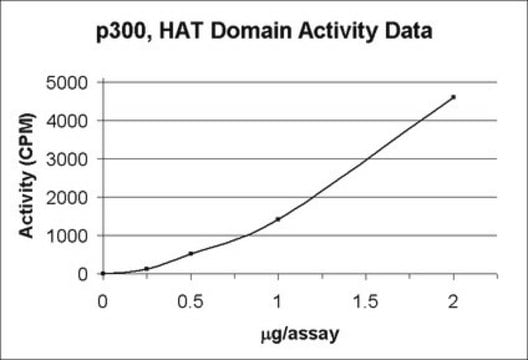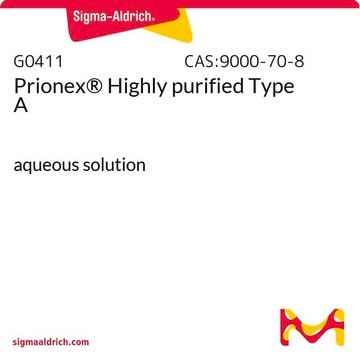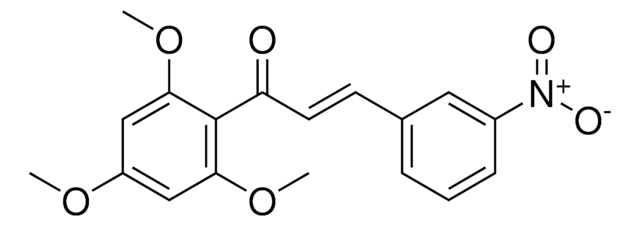SRP2086
p300 (C1135-2414) human
recombinant, expressed in insect cells, ≥70% (SDS-PAGE)
Synonym(s):
KAT3B, RP1-85F18.1, RSTS2, p300
Sign Into View Organizational & Contract Pricing
All Photos(1)
About This Item
UNSPSC Code:
12352200
NACRES:
NA.26
Recommended Products
biological source
human
recombinant
expressed in insect cells
Assay
≥70% (SDS-PAGE)
form
frozen liquid
mol wt
~145 kDa
packaging
pkg of 4 μg
concentration
350 μg/mL
color
clear colorless
NCBI accession no.
UniProt accession no.
shipped in
dry ice
storage temp.
−70°C
Gene Information
human ... EP300(2033)
General description
E1A binding protein p300 (p300) has a central bromodomain and three cysteine- and histidine-rich regions. The carboxy-terminal region interacts with the adenovirus oncoprotein E1A. The gene encoding this protein is localized on human chromosome 22q13.
Biochem/physiol Actions
Human p300 and CBP (CREB binding protein) are highly related transcriptional coactivators. Both proteins have been identified through protein interaction assays. In addition to interacting with a variety of cellular factors and onco-proteins, loss of the wild type CBP alleles in isolated tumors suggests that CBP/p300 might serve as a tumor suppressor. The C-terminus of p300 contains a histone acetyltransferase (HAT) domain expanded from residues 1195 to 1673, an activation domain (residues 1763-1812) that interacts with many transcription factors and an SRC-1 domain further down stream of the activation domain. P300 is able to acetylate histones and many other transcription factors, including p53, E2F, TFIIE, and TFIIF etc. implicating diverse roles of p300 in gene regulation.
Physical form
Clear and colorless frozen liquid solution
Preparation Note
Use a manual defrost freezer and avoid repeated freeze-thaw cycles. While working, please keep sample on ice.
Storage Class Code
10 - Combustible liquids
WGK
WGK 1
Flash Point(F)
Not applicable
Flash Point(C)
Not applicable
Certificates of Analysis (COA)
Search for Certificates of Analysis (COA) by entering the products Lot/Batch Number. Lot and Batch Numbers can be found on a product’s label following the words ‘Lot’ or ‘Batch’.
Already Own This Product?
Find documentation for the products that you have recently purchased in the Document Library.
R W Stein et al.
Journal of virology, 64(9), 4421-4427 (1990-09-01)
Adenovirus E1A transforming function requires two distinct regions of the protein. Transforming activity is closely linked with the presence of a region designated conserved domain 2 and the ability of this region to bind the product of the cellular retinoblastoma
Expanding the phenotypic spectrum in EP300-related Rubinstein-Taybi syndrome.
Solomon BD
American Journal of Medical Genetics. Part A, 167A(5), 1111-1116 (2015)
R Eckner et al.
Genes & development, 8(8), 869-884 (1994-04-15)
The growth-controlling functions of the adenovirus E1A oncoprotein depend on its ability ot interact with a set of cellular proteins. Among these are the retinoblastoma protein, p107, p130, and p300. We have isolated a cDNA encoding full-length human p300 and
J C Chrivia et al.
Nature, 365(6449), 855-859 (1993-10-28)
Cyclic AMP-regulated gene expression frequently involves a DNA element known as the cAMP-regulated enhancer (CRE). Many transcription factors bind to this element, including the protein CREB, which is activated as a result of phosphorylation by protein kinase A. This modification
Molecular cloning and functional analysis of the adenovirus E1A-associated 300-kD protein (p300) reveals a protein with properties of a transcriptional adaptor.
Eckner R
Genes & Development, 8(8), 869-884 (1994)
Our team of scientists has experience in all areas of research including Life Science, Material Science, Chemical Synthesis, Chromatography, Analytical and many others.
Contact Technical Service








